Seven Impossible Interviews Before Breakfast #55 (Winter Blog Blast Tour edition): Gabrielle Zevin
 November 9th, 2007 by eisha
November 9th, 2007 by eisha

I just love the fact that we’re finishing up our participation in the Winter Blog Blast Tour with our 55th interview!!! Five happens to be my favorite number, and to see two of them right there together like that makes me go a little tingly.
It’s especially appropriate, because Jules and I are really really pleased to be able to interview Gabrielle Zevin for the WBBT. A couple of months ago, we had the extreme pleasure of “tri-reviewing” her latest YA novel, Memoirs of a Teenage Amnesiac, with Jen Robinson of Jen Robinson’s Book Page. The multi-layered plot and well-developed characters gave us a lot to talk about, so we were grateful for the chance to ask Gabrielle a little more about Memoirs, as well as her other novels and screenplays.
In case you’ve missed any of this talented author’s offerings, here’s a little Gabrielle Zevin 101:
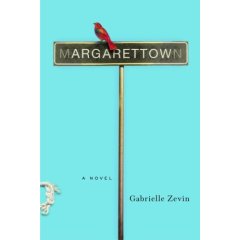 Although Zevin is best known for her young adult novels, her first published novel is for adults: Margarettown (Miramax, 2005). An unusual love story, the novel “reiterates female complexity through a husband and daughter’s experiences with one surprising woman” (Publisher’s Weekly). In it, the narrator chronicles his relationship with Margaret “Maggie” Towne to their daughter, describing a trip to her childhood home – Margarettown – during their courtship. The town’s population consists of a handful of women and girls, all named with variations of Margaret, who seem to share more in common with Maggie than a name. Publisher’s Weekly calls the story “darkly whimsical,” and Booklist states that it “can be deeply insightful about marriage, presenting it as equal parts bravery and
Although Zevin is best known for her young adult novels, her first published novel is for adults: Margarettown (Miramax, 2005). An unusual love story, the novel “reiterates female complexity through a husband and daughter’s experiences with one surprising woman” (Publisher’s Weekly). In it, the narrator chronicles his relationship with Margaret “Maggie” Towne to their daughter, describing a trip to her childhood home – Margarettown – during their courtship. The town’s population consists of a handful of women and girls, all named with variations of Margaret, who seem to share more in common with Maggie than a name. Publisher’s Weekly calls the story “darkly whimsical,” and Booklist states that it “can be deeply insightful about marriage, presenting it as equal parts bravery and 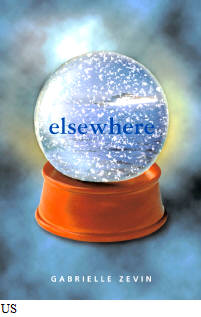 foolishness.”
foolishness.”
Zevin burst onto the young adult literature scene a scant three months later with Elsewhere (Farrar Straus & Giroux), a hauntingly original portrait of the afterlife. The protagonist, Liz, is killed in a traffic accident and wakes up on a cruise ship heading to Elsewhere, a place that seems on the surface to be a lot like a suburban American city, complete with strip malls, jobs, currency, and an observation deck where Liz can peek in on her living friends and family. Liz has to come to terms with what happened to her, and with the loss of her future, as she reverse-ages into childhood and babyhood in preparation for reincarnation. As Booklist stated, “this inventive novel slices right to the bone of human yearning, offering up an indelible vision of life and death as equally rich sides of the same coin.” The New York Times Book Review raved: “Zevin’s touch is marvelously light even as she considers profundities, easily moving among humor, wisdom and lyricism.” It garnered heaps of awards, including ALA’s Teens Top Ten and School Library Journal’s Best Books of the Year.
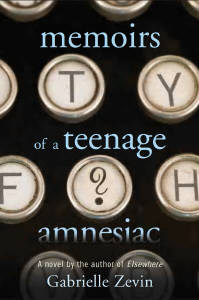 This year saw the publication of Memoirs of a Teenage Amnesiac (Farrar Straus & Giroux), another excellent young adult offering. The main character, Naomi, is a high school junior who suffers a head injury and loses all memory of the past four years of her life, including her parent’s divorce, her step-sister’s birth, and the complicated relationships she has with her jock boyfriend Ace and her quirky best friend Will. As she struggles to catch up to her own life, she finds herself drawn to the “exquisitely depressed” James, who understands her desire to dump all ties to the past and start from a blank slate. As I already mentioned, Jules, Jen Robinson and I have already raved about this one in our tri-review in September – Jen called the writing “top-notch, with the right mix of plotting and introspection, as well as flashes of humor.” But if you don’t want to take our word for it, Booklist stated in its review that “Zevin writes revealingly about emotions and relationships. Especially vivid is the Hepburn-Tracy bond Naomi shares with yearbook co-chief Will, whom she wounds with her lurching self-reinvention even as she discovers deeper feelings.”
This year saw the publication of Memoirs of a Teenage Amnesiac (Farrar Straus & Giroux), another excellent young adult offering. The main character, Naomi, is a high school junior who suffers a head injury and loses all memory of the past four years of her life, including her parent’s divorce, her step-sister’s birth, and the complicated relationships she has with her jock boyfriend Ace and her quirky best friend Will. As she struggles to catch up to her own life, she finds herself drawn to the “exquisitely depressed” James, who understands her desire to dump all ties to the past and start from a blank slate. As I already mentioned, Jules, Jen Robinson and I have already raved about this one in our tri-review in September – Jen called the writing “top-notch, with the right mix of plotting and introspection, as well as flashes of humor.” But if you don’t want to take our word for it, Booklist stated in its review that “Zevin writes revealingly about emotions and relationships. Especially vivid is the Hepburn-Tracy bond Naomi shares with yearbook co-chief Will, whom she wounds with her lurching self-reinvention even as she discovers deeper feelings.”
You may not already know, but Gabrielle Zevin is also an accomplished screenwriter, who frequently collaborates with her partner, director Hans Canosa. Her first film, Alma Mater (Yonder Light Films, 2002), concerns a love triangle between a Harvard professor, his wife, and his male student, set around the time of John F. Kennedy’s assassination. It won an Audience Award at the Austin Film Festival and was nominated for a Golden Starfish Award at the Hamptons International Film Festival. I haven’t actually seen it yet, but I’m going to have to, because I just discovered it features John Krasinski. Yum.
I have seen Conversations with Other Women, though, and I can tell you it’s an amazing piece of cinematic storytelling. Masterfully directed by Canosa entirely in split-screen, it stars Helena Bonham-Carter and Aaron Eckhart. The film follows a man and woman who begin a conversation at a wedding that they continue in her hotel room. As they talk, flirt, argue, have sex, talk some more, etc., their history and relationship is slowly revealed, simultaneously, from both points of view. If you like intelligent, quirky maybe-love-maybe-not stories, I highly recommend it.
We really are grateful to Gabrielle Zevin for taking the time to answer our questions. She’s a busy lady, and much in demand these days, so we feel quite privileged for the opportunity. We’ve also enjoyed participating in the Winter Blog Blast Tour, and want to extend huge props to Colleen Mondor of Chasing Ray for organizing the whole behemoth.
Enjoy the interview!
7-Imp: What was it like to have Hans Canosa, your partner, direct Conversations With Other Women, for which you wrote the screenplay? Do you enjoy collaborating artistically together on such projects?
Gabrielle: I can honestly say that I never would have written Conversations with Other Women without Hans. One morning, he came to me with the idea for a film that would be shot entirely split-screen – I think he’d had a crazy dream the night before. I remember being a bit skeptical, but we both agreed that the only reason to do a movie that way was if there was a story that justified the conceit. So, I told him I’d think about it. And a couple days later, I went back to him with the concept for a two-character piece about a man and a woman, who may or may not be together. Each side of the screen would, in a sense, reflect their individual points of view. In any case, I can truly say I can’t imagine anyone but Hans having directed it, because he was there from the very beginning and the script was absolutely written for him. And it really was the perfect project for us to work together on – two characters, two actors, two frames, and the two of us. I very much enjoy collaboration as it can be a really welcome break from book writing. When you’re working on a novel, you are alone for a very long time. When you’re working on a film, you know from the beginning that many, many other people become part of the process.
7-Imp: The combination of your storytelling technique and the split-screen cinematography makes for a very compelling combination in the film. Did you have a lot of input into the production of the film, beyond contributing the screenplay? What was it like for you to see your story realized on film?
Gabrielle: Not really. I went out to LA for the making of the film, and I was on set every day, usually with a huge stack of manuscript pages on my lap – Elsewhere and Margarettown were both in copyediting at the time. I would occasionally whisper little things in Hans’s ear, usually small dialogue changes – for instance, Helena Bonham Carter’s character wasn’t written to be British so that required some small modifications – usually ones she made herself, by the way. And the other thing I did was I selected all the songs on the soundtrack: the three Carla Bruni songs and the one Rilo Kiley.
Conversations played the opening night of the Telluride Film Festival, and I got to fly out for it. It was crazy because the plane was packed with really famous film critics, and my most vivid memory of the weekend was stuffing my dog under Roger Ebert’s butt. (He was in the seat ahead of me on the flight…) And I kept worrying that my dog would bark, and Ebert would somehow KNOW that I had written Conversations, and we’d get a terrible review. Well, the pug stayed quiet, and we got a really nice review from Ebert. I doubt this answers the question, but in a weird way, this is what it was like.
7-Imp: You say at your site that Margarettown came “easily and quickly and naturally . . .” Did you have that experience with Elsewhere and Amnesiac? Which of those books was more difficult to construct, to piece together? How is the screenplay (for This Is That) of Margarettown going? Are there still plans to adapt it to the big screen?
Gabrielle: Elsewhere was easy because I was completely guileless when I wrote it. I wrote it in a blistering five months – I was possessed. Really, I mean I knew nothing about publishing, didn’t have an agent, nothing. It was craziness. Amnesiac was all stops and starts. (There’s a reason it’s dedicated to the editor…) The first draft was 37,000 words long and when I was done, the only thing I really liked about it was the title. Less that a thousand words from the first draft remain in the final book. So, when people ask me how long it takes to write a book, I just laugh – one never knows. This, by the way, is why I’ve never wanted to sell books in proposal. When I finish a book, I want readers to know that I finished it because I was DONE, not because the publication date was June 2010 or whatever.
Well, I’m currently (supposedly) revising the Margarettown screenplay, so we’ll see how that goes… There’s been film activity around my other books, too – but honestly, I don’t spend a lot of time holding my breath. In my first five years as a screenwriter, I optioned five or six scripts – guess how many have become movies?
7-Imp: You also talk at your site about how with Margarettown and Conversations, you are writing about the idea of a “woman being many women.” In a way, you could say that Amnesiac touches upon this theme as well, in that Naomi, by virtue of her memory loss, is suddenly open to the possibility of being a new young woman, or perhaps even more than one, so to speak – that, essentially, she has the chance to re-invent herself. Do you intentionally set out to write about such themes for women, or do you just find yourself drawn to these themes with each thing you write?
Gabrielle: I probably write about women because I am one. (Or many?!?) It’s not conscious, no, though I will tell you I wrote a play when I was seventeen called Fugue for Seven Madwomen – it was about this crazy girl who has seven of her “friends” over for lunch and they all turn out to be her – so I suspect I’ve been playing with this theme for many years. For me, Margarettown and Conversations were about the feasibility of commitment when men and women inevitably change over time. So, I really and truly (and naively) think I’m writing about the way PEOPLE (not just women) change… In Memoirs, for instance, I think James is arguably undergoing more changes more than Naomi. But, from my point of view, the theme of Memoirs was less about women and more about the way the story you tell about your life effectually becomes your life… But your theory’s as good as mine.
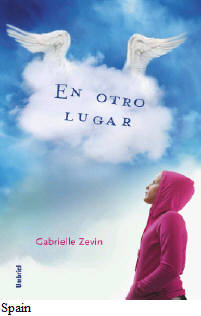 7-Imp: Can you pinpoint what exactly made you want to write about the Great Beyond in Elsewhere? We think it’s a fascinating premise. And which of all those creative international jacket covers do you think is most fitting for the novel?
7-Imp: Can you pinpoint what exactly made you want to write about the Great Beyond in Elsewhere? We think it’s a fascinating premise. And which of all those creative international jacket covers do you think is most fitting for the novel?
Gabrielle: Well, most of my books have started out with a question I’d been asking myself. With Elsewhere, it had been September 11th (I live in NYC), my dog had sprouted a mysterious lump, my grandmother had been diagnosed Alzheimer’s, my best friend was getting married, I felt at a professional crossroads, and I might have been just a little depressed, etc., etc. The question I was asking was, how do you live in the world when it’s filled with so much loss? So, when people ask me why I chose to write about the afterlife, I tell them, the reason we tell stories about the next life is because we’re trying to make sense of this one.
I love all the jackets! I love how they reflect cultural assumptions about the afterlife – the winged girl on the cover of Spain’s Elsewhere, for instance. The one that makes me laugh the most is Italy – it has a long-haired girl in a sports car… Because, of course, a long-haired girl in a sports car is heaven if you’re Italian. My favorite might be Japan because it’s lovely and it’s the only one with a dog.
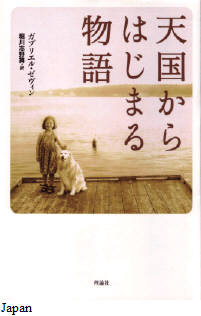 7-Imp: A lot of our readers like to hear authors talk about this (and Gwenda at the blog Shaken & Stirred usually asks this, so we’re borrowing from her). Tell us about your writing process (starting wherever you like: getting the idea, starting to write, under deadline, etc. Do you outline plot before you write or just let your muse lead you on and see where you end up?).
7-Imp: A lot of our readers like to hear authors talk about this (and Gwenda at the blog Shaken & Stirred usually asks this, so we’re borrowing from her). Tell us about your writing process (starting wherever you like: getting the idea, starting to write, under deadline, etc. Do you outline plot before you write or just let your muse lead you on and see where you end up?).
Gabrielle: I don’t believe in process anymore. I used to tell people all about my note-taking and my notecards and my outlines and the quiet room and now I realize, I change with every book. The only thing I know for sure is, at some point, I will want to quit. I also think A LOT before I start writing, and the time I don’t spend writing can be incredibly valuable. Sometimes you’ll hear teachers push the idea of WRITE EVERY DAY – and yeah, I do try to write every day – but the truth is, writing (with craft and purpose) is not the same as typing. What a good process does for a writer is it helps the writer get out of his or her own way – but I think the tendency to romanticize process can be a pretty destructive thing for a writer. So, yeah, I will outline and think and take notes and research – and then when, I’m ready, I begin.
7-Imp: We like your new web site. Do you think you’ll ever change your mind about blogging? Or will it never be for you?
Gabrielle: Thanks! I really didn’t want to have a website, but I’m glad I do now. You hear from so many interesting people.
As for blogging? Never say never… But I doubt I will ever blog. I find that I only have a limited number of words each day. And the other thing is, I’m just not a person who knows immediately what she thinks about every subject on the planet. And I feel like the more people know about you, the harder it is for them to read your books without thinking of YOU. And I think, in life, we must always ask, what am I trying to do here? And, for me, the answer isn’t: I want to be an internet celebrity.
7-Imp: It’s pretty bold (or should we say… “cocky”?) and great of you to post bad reviews of your works on your website. What’s your rationale for “embracing the badness”?
Gabrielle: Oh, it was tremendously satisfying and liberating to do that! I think girls especially are raised in fear of people saying “bad things” about them. And yeah, I definitely carried that mentality over to the beginning of my writing career. When I was a kid, one of my teachers once wrote, “Gabrielle does not take criticism well.” But well, part of writing (and living, for that matter) is dealing with criticism. In children’s books, you have all those people who tally starred reviews – well, I think that’s shortsighted. The best, most interesting work usually inspires extreme reactions. It’s not a “how few people were able to find fault with this” contest. In any case, I’m proud of my bad reviews. Because the artists I admire most have LOADS OF THEM. And if no one hates your books a little, you’re probably writing boring books.
7-Imp: What do you cover (generally) in your school visits and do you enjoy such author appearances in schools and bookstores?
Gabrielle: As I type this, I’m on a plane back from San Francisco – it’s the end of a two week book tour – so I’ve been pretty much talking non-stop. I tell the kids how the best thing about being a writer is that no one can say you’re a writer, and no one can say you aren’t one either. I tell them how I never won the short story contest in school. I tell them that life, and everything that happens to you, is where stories come from. I do enjoy author appearances, but I just don’t have the time to do it very often – I’m very protective of my writing time.
7-Imp: We know this is a cliche question, but as book lovers, it interests us: What books or authors influenced you as an early reader?
Gabrielle: The first book I ever read was Little House in the Big Wood – I didn’t love it, truth be told. But what I did like very much was the experience of book buying and the experience of being a reader. The first book I ever loved was probably Anne of Green Gables. I loved A Little Princess, too. I was a sucker for an orphan story in those days. I also loved Summer of My German Soldier and A Summer to Die –obviously, my books with summer in the title phase. I went to three different elementary schools when I was a kid, and they ALL read Charlotte’s Web out loud in class as an end-of-school-year treat. I used to think to myself, it must be June if the spider dies. But I think Charlotte’s Web is the book that influenced Elsewhere more than any other. One year, we did the inane “read as many Caldecott and Newbery Medal books as you can” contest – I read seventeen Caldecott books and eighteen Newbery’s. I remember Jacob Have I Loved and From the Mixed Up Files… the most fondly, and Strawberry Girl, the least. Another year, my friend and I had a “who could read all of Narnia faster” contest. Around A Horse and His Boy, I quit and just told her I’d read them.
7-Imp: What’s one thing that most people don’t know about you?
Gabrielle: I lie in interviews.
7-Imp: If you could have three (living) authors — whom you have not yet met — over for coffee or a glass of rich, red wine, whom would you choose?
Gabrielle: When I really adore a book, I almost always feel like I don’t want to meet the author. And recently, I was reading some book where I felt completely sure that the author would think I was ugly, so I definitely didn’t want to meet him either.
Let’s see… John Irving? J.D. Salinger? And now I need a girl… Maeve Binchy? Doesn’t she seem like she’d be nice? And there ought to be someone who writes for the youth, too… MT Anderson, I reckon. Now, I’m having a whole dinner party.
7-Imp: Are you working on a new novel or screenplay, or any other writing projects you can tell us about?
Gabrielle: Yes, I’m finishing a novel for the grown ups. And once I’m done with that, I know exactly what I’m going to write next for the youth – I do it all for the youth.
7-Imp: Is there something you wish interviewers would ask you – but never do? Feel free to ask and respond here.
Gabrielle: Seriously, I think you guys have asked everything! Thanks so much!
7-Imp: What is your favorite word?
Gabrielle: “Redemption.”
7-Imp: What is your least favorite word?
Gabrielle: “Baffled.”
7-Imp: What turns you on creatively, spiritually or emotionally?
Gabrielle: Beds.
7-Imp: What turns you off?
Gabrielle: Feint praise.
7-Imp: What is your favorite curse word? (optional)
Gabrielle: “Fuck,” because it’s so incredibly versatile.
7-Imp: What sound or noise do you love?
Gabrielle: A great song. My dog snoring.
7-Imp: What sound or noise do you hate?
Gabrielle: When I’m on my cell phone, and it decides to echo my own voice. Also, sledgehammers.
7-Imp: What profession other than your own would you like to attempt?
Gabrielle: Music supervisor for films. Lifeguard.
7-Imp: What profession would you not like to do?
Gabrielle: Boxer. Fireman. I’m afraid of head trauma and being burned alive.
7-Imp: If Heaven exists, what would you like to hear God say when you arrive at the Pearly Gates?
Gabrielle: “Take two.”
For more information on Gabrielle Zevin and her works:
* “Bloomsbury Q & A: Gabrielle Zevin.”
* Farrar Straus Giroux: “Q & A: Meet Gabrielle Zevin;” 2005.
* Teenreads.com: “Author Profile: Gabrielle Zevin;” bio, 2007 interview, and 2005 interview.
* Barnes & Noble: “Meet the Writers: Gabrielle Zevin;” Fall 2005.
* Nantucket Independent: “Conversations with an Emerging Screenwriter Gabby Zevin;” June 14, 2006.
* “indieWIRE INTERVIEW: Hans Canosa, director of Conversations With Other Women;” August 9, 2006.
* The Longstockings: “Gabrielle Zevin Stops By for a Chat!” October 7, 2007.
* Jen Robinson’s Book Page: “WBBT: Gabrielle Zevin Interview;” November 6, 2007.
Today’s Winter Blog Blast Schedule:
* Loree Griffin Burns at Chasing Ray
* Lily Archer at The Ya Ya Yas
* Rick Riordan at Jen Robinson’s Book Page
* Dia Calhoun at lectitans
* Shannon Hale at Miss Erin
* Jane Yolen & Adam Stemple at Shaken & Stirred
* Alan Gratz at Interactive Reader
* Lisa Yee at Hip Writer Mama

I stopped dead in the middle of this interview as soon as I saw that movie poster and scooted over to Netflix. Conversations with Other Women is now safely tucked into my queue. And I could return to the rest of this juicy interview. So much here, and all so good. I love her story of her dog and Roger Ebert’s butt!
I had discovered her “bad reviews” page awhile ago and was just in awe. Ha! I SO agree about pissing a few people off with your books. Otherwise, why not write greeting cards?
Oh, this is rich — I love so much that her writing process consists of knowing that she will want to QUIT!!! Can we all just tell the truth like that, please!!
“if no one hates your books a little, you’re probably writing boring books.” I could see that on a t-shirt…
I think I love the Spanish cover of Elsewhere the very best! Very interesting interview, guys!
Thanks for the lovely, insightful interview. I really enjoyed it!
I love the answers she gives in the Pivot Questionnaire. Especially for favourite curse word. I’m glad to hear she is going to write another youth book. I have simply adored Memoires of a Teenage Amnesiac and Elsewhere. They have both made me really think about thindgs, espicially Memoires of a Teenage Amnesiac.
What a great interview!